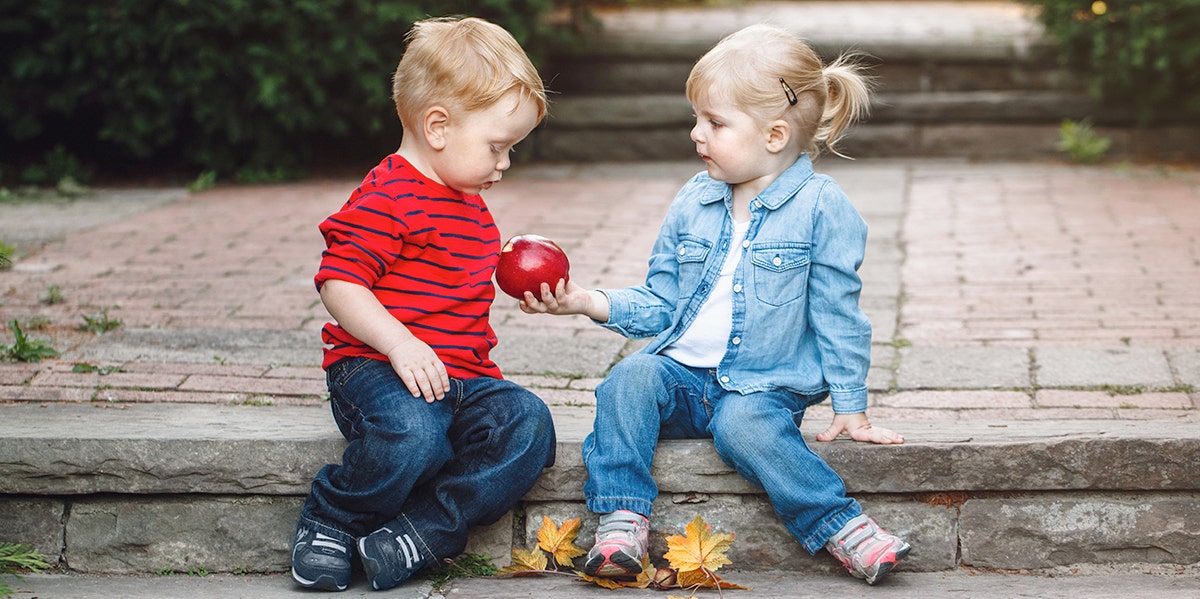If You're Teaching Your Kids To Share, You're Doing It Wrong
You might need to rethink everything you've ever known...
 Anna Kraynova / Shutterstock
Anna Kraynova / Shutterstock By Rebecca Gruber
One of the principles of early childhood education is teaching children to play well together, which usually translates into teaching kids to share.
If you've ever seen three preschoolers playing in the sandbox, you know that even if there are 10 toys in there, they'll all want the same one, and there's usually a meltdown when one child doesn't get it.
But maybe sharing shouldn't be the goal of early childhood education.
There's a new movement discouraging parents from teaching their kids to share, and it's gaining traction with parents and preschools alike.
Stop teaching your children to share.
"Forcing children to share doesn't teach the lessons we want them to learn," Dr. Laura Markham, author of Peaceful Parent, Happy Siblings, said. "Let's agree that the goal is for our children to grow into generous people who are able to notice and respond to the needs of others."
In early educational settings, kids are learning to be able to meet their own needs, which, at this point in their lives, includes working and playing in their communities.
"We don't want our kids to feel they should interrupt what they're working on to 'give' something to another child just because the other child asks," she added.
According to Dr. Markham, rather than teaching kids to speak up for themselves, forced sharing teaches them:
1. If I cry loud enough, I get what I want, even if someone else has it.
2. Parents are in charge of who gets what when, and it's arbitrary, depending on their whim and how dramatically I beg for my turn.
3. My sibling and I are in constant competition to get what we need. I don't like him.
4. I guess I'm a greedy person, but that's what I need to be in order to get what I deserve.
5. I better "play fast" because I won't have this item for long.
6. I won! But soon I will lose again. I better protest loudly when my turn is up to get every minute I can. And then start protesting again as soon as it's my sibling's turn. If I make my parent miserable, I'll get more time with the toy.
Give kids tools instead.
So what should they be taught? Dr. Markham said kids need to be given the tools to handle these situations.
"We do want our child to notice when another child would like a turn, and to ensure that child gets a turn," she commented. "And when someone else has something that our child wants, we hope that she'll be able to control her impulses so she doesn't grab it, but instead will use her words to work out an arrangement so that she can use the object in the future."
By teaching kids to advocate for themselves and not immediately share their toys, they aren't waiting for someone to tell them their time is up, and they can therefore play more freely with them.
"The conventional approach of forced sharing undermines the ability of children to lose themselves in play, as well as undermining the sibling relationship by creating constant competition," Dr. Markham explained. "Neither child gets to experience the generosity of having their fill and giving to the other."
What's can a parent or educator do?
"I encourage self-regulated turns, where the child decides how long to use the toy so she can fully enjoy it, and then can give it up to the other child with an open heart," Dr. Markham said.
She believes that doing so will help the child experience the feeling of satisfaction that comes with making someone happy while ultimately teaching generosity. In turn, she believes the experience is more educational, teaching kids:
1. I can ask for what I want. Sometimes I get a turn soon, and sometimes I have to wait.
2. It's OK to cry, but it doesn't mean I get the toy.
3. I don't get everything I want, but I get something better. My parent always understands and helps me when I'm upset.
4. After I cry, I feel better.
5. I can use another toy instead and really enjoy it. I'm getting better at waiting.
6. I don't have to whine and cry to my parent to convince them to get me a turn. Everybody has to wait for their turn, but everybody gets a turn sooner or later.
7. I like the feeling when my sibling gives me the toy. I like her.
8. I can use a toy for as long as I want; nobody will make me give it to my sibling at a moment's notice. When I'm done with the toy and give it to my sibling, I feel good inside — I like to give her a turn. I'm a generous person.
The end result is a child who learns patience and empathy and may be better equipped to handle bigger situations in the future.
Rebecca Gruber is the Vice President of Branded Content for PopSugar, PR guru, and mom to two wonderful boys. Follow her on PopSugarMoms.
YourTango may earn an affiliate commission if you buy something through links featured in this article.
